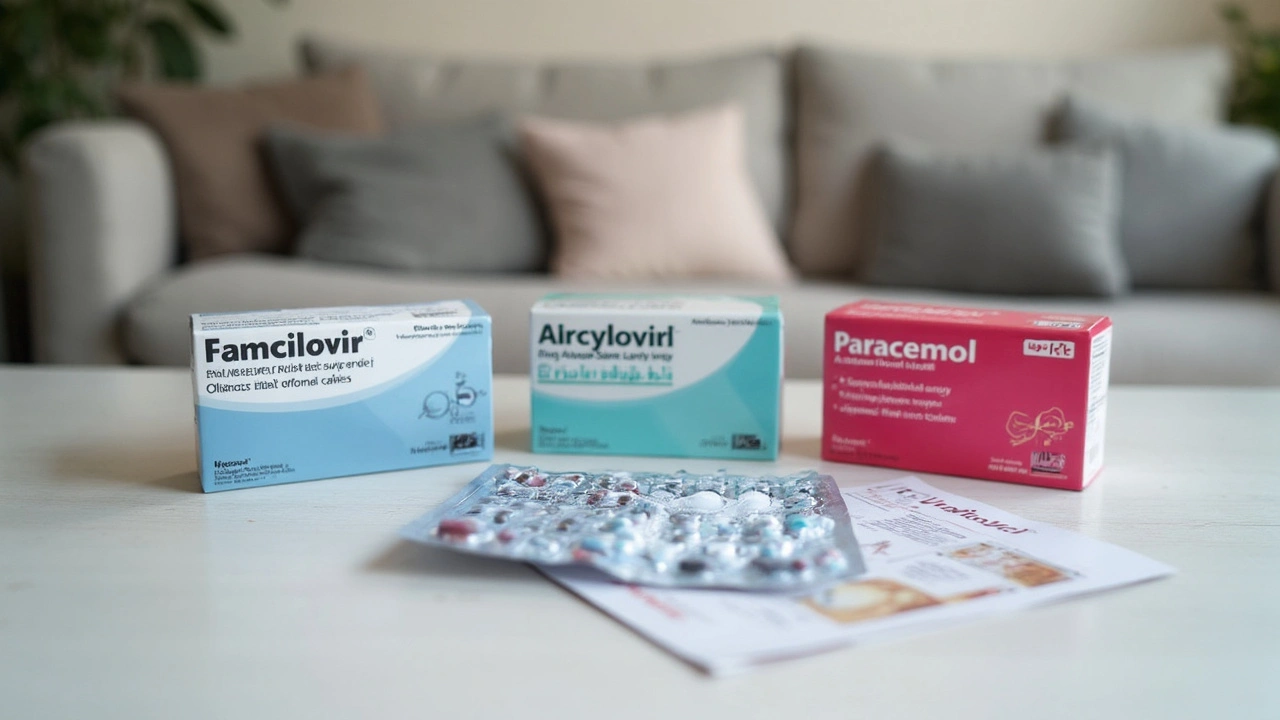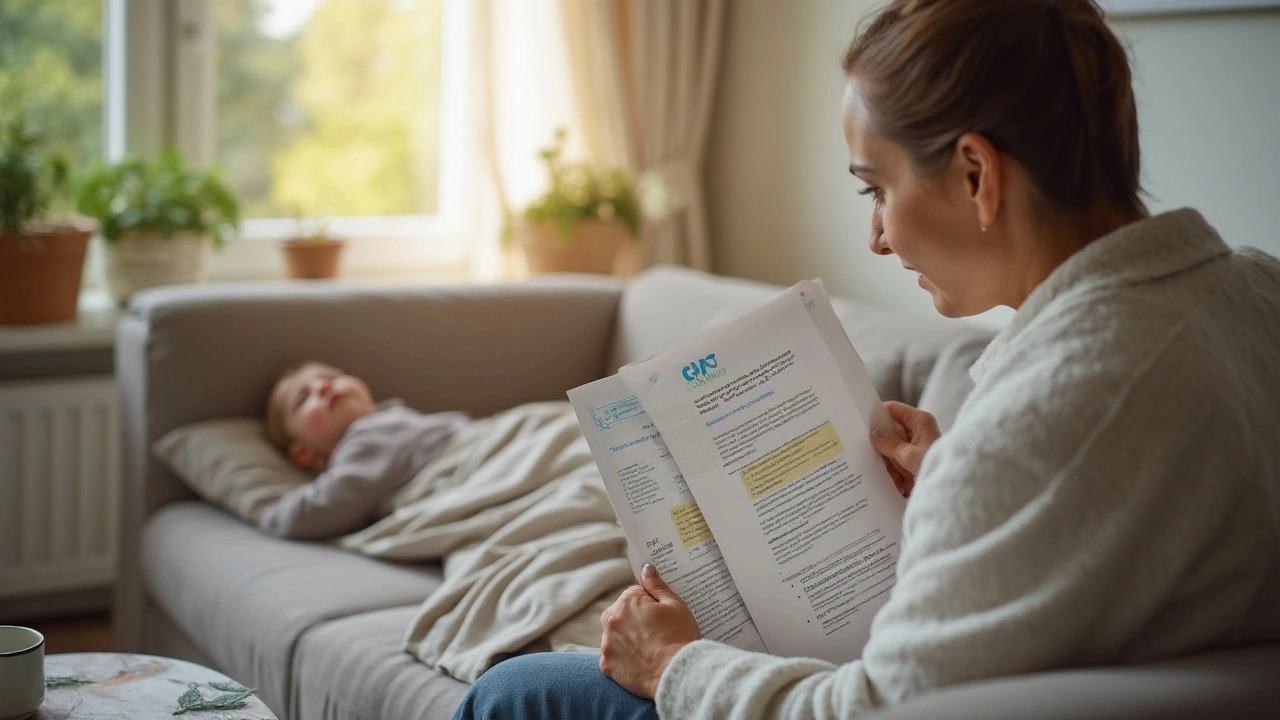Picture this: your kid, niece, or even your adult friend breaks out in itchy red spots and suddenly feels like a walking oven with a pounding headache. Everyone says it's chickenpox, an infection most people think only hits toddlers, but adults can get slammed even harder. Fast forward — you're online, desperate for anything that will speed up recovery. The usual go-to is acyclovir, but what about the less talked-about antiviral, famciclovir? Some doctors mention it, but is it all hype, or is there evidence that famciclovir works for chickenpox?
Understanding Chickenpox and Why Treatment Matters
Chickenpox, or varicella, comes from the varicella-zoster virus. It’s a highly contagious illness, usually spreading like wildfire among kids who haven’t been vaccinated. The virus isn’t picky: it travels by sneezes, coughs, or even just breathing the same indoor air as someone infected. Once you catch it, there’s no quick escape— expect a fever, miserable itching, and a rash that goes from red spots to blister-like bumps over a week. For healthy children, it’s mostly an uncomfortable rite of passage, but adults, pregnant people, and anyone with a weakened immune system can face serious problems — think pneumonia, encephalitis, or skin infections.
Over 95% of adults in the US have already had chickenpox or are protected by the vaccine. Still, in older teens or adults who never caught it as kids, chickenpox is a wild card. About 1 in every 400 adults who gets it lands in the hospital, with the risk of complications spiking nearly twentyfold compared to children. Here’s where medication steps in. Back in the '90s, doctors started using acyclovir, which can shorten the illness by about a day if started early. Since then, a couple of new kids on the antiviral block have shown up: valacyclovir and famciclovir, both designed to fight herpes viruses. But is famciclovir actually useful when it comes to this scratchy nuisance?
What Is Famciclovir and How Does It Work?
Famciclovir is an antiviral that attacks herpes viruses by stopping them from making more copies of themselves. After you swallow a famciclovir pill, your body quickly turns it into penciclovir, the chemical that does the heavy lifting. Penciclovir messes with the virus’s DNA, so the virus can't multiply and spread. Famciclovir is mainly famous for treating shingles (which is actually chickenpox making an encore in later life) and cold sores. So, the leap to using it for chickenpox isn’t that wild — both illnesses are caused by the same sneaky virus.
What’s different about famciclovir? First, it’s got strong absorption — only about 22% of an acyclovir dose is absorbed into your blood, but with famciclovir, it’s closer to 77%. Second, you only need to swallow it two or three times a day, versus five times for plain acyclovir — a huge bonus if you’re feeling awful and don’t want to keep track of endless pills. Last, famciclovir is less harsh on the kidneys, which becomes a real concern if you’re sick or older.
But here’s the catch: famciclovir isn’t officially FDA-approved for treating chickenpox in the United States. That doesn’t stop some doctors from turning to it when acyclovir isn’t an option, especially for adults or those with special medical needs. But before you start popping pills, let’s see how well famciclovir really stands up to chickenpox in the real world.

The Evidence: How Well Does Famciclovir Treat Chickenpox?
Start searching medical journals, and you’ll hit a wall: there aren’t a ton of large studies on famciclovir for chickenpox, especially in kids. Instead, we’ve got a handful of research papers, some small trials, and a lot of experience treating shingles. The studies that do exist point in an interesting direction — one 2001 trial out of Europe included 71 adults with chickenpox; researchers compared famciclovir to standard acyclovir. Both drugs seemed to do the job pretty well: they shortened the number of fever days and helped the rash scab over faster, typically within a week instead of the usual 8-9 days. No one experienced serious side effects, and most people reported less itching and faster healing with either drug. Famciclovir didn’t blow acyclovir out of the water, but it was on par.
| Antiviral | Dosing (for adults) | Common Side Effects | Absorption (%) |
|---|---|---|---|
| Acyclovir | 800 mg 5x daily | Nausea, vomiting | 22 |
| Valacyclovir | 1,000 mg 3x daily | Headache, upset stomach | 55 |
| Famciclovir | 500 mg 3x daily | Headache, nausea | 77 |
Outside clinical trials, doctors sometimes pick famciclovir for older adults with chickenpox since it’s easy to take, especially for anyone juggling other meds. Occasionally, it’s used in kids, but most pediatricians stick with acyclovir since it’s got a longer record of use in children. As for side effects, famciclovir is no scarier than a heavy-duty allergy pill: you might get a mild headache, queasiness, or a slightly upset stomach. Kidney problems can happen, especially in those with pre-existing kidney issues, but that’s true for most antivirals. If you’re allergic to drugs like penciclovir, though, famciclovir is off-limits.
Still, here’s the big takeaway: starting any antiviral, including famciclovir, works best if you catch chickenpox really early — ideally within the first 24-48 hours of the rash popping up. Wait longer, and the drugs don’t make a dent in your illness. And don’t expect a total cure — you’ll still get the rash and the fever, but your misery might wrap up a little sooner, and you’re less likely to end up with nasty scars or complications.
Tip for parents: if your child breaks out in chickenpox but is otherwise healthy, most doctors won’t even recommend antiviral pills. Chickenpox usually just runs its course. But high-risk folks — adults, pregnant women, newborns, or anyone with a weak immune system — should get to a doctor quickly to talk about medication options, including famciclovir if acyclovir is out. If you’re not sure, always ask a healthcare provider instead of guessing.
Practical Tips for Managing Chickenpox and Using Antivirals Safely
Let’s be real: no one enjoys having chickenpox, but there are ways to make things less awful. If you or someone you know comes down with it, here’s what you need to remember:
- Start antivirals ASAP: Whether it’s famciclovir or another antiviral, starting treatment in the first 24-48 hours after the rash appears gives you the best shot at faster healing.
- Stick to the prescribed dose: For adults, the typical famciclovir dose is 500 mg three times a day for 7 days. Missing doses makes the drug less effective.
- Watch for side effects: Most people do fine, but call your doctor if you notice trouble urinating, severe headaches, or confused thinking.
- Hydrate: Drink lots of fluids — chickenpox can dehydrate you, and it helps protect your kidneys if you’re on antivirals.
- Don’t scratch: Itching makes everything worse. Trim nails short, wear gloves if needed, and ask about antihistamines or oatmeal baths to calm the itch.
- Isolation is key: Stay home until the rash crusts over and you haven’t had a new spot in at least 24 hours — that’s when you’re no longer contagious.
- Don’t stop other meds: If you’re taking other prescription drugs, check with your doctor to make sure there are no interactions with famciclovir.
If you’re a parent, resist the urge to give aspirin to children with chickenpox — aspirin can trigger Reye’s syndrome, a rare but potentially fatal condition. Stick to acetaminophen for fevers unless told otherwise. And no, herbal teas and internet cures won’t do much for the virus, though a cool bath can help with itching.
And if you’re wondering if the vaccine is worth it? Since the late ‘90s, the U.S. chickenpox vaccine cut chickenpox cases by 90%, hospitalizations by 84%, and deaths by nearly 98%. The best treatment is never getting sick in the first place, but if you do, famciclovir is a solid backup — especially for adults who miss the vaccine boat and get hit hard by the virus. If you’re in a country where famciclovir isn’t approved for chickenpox but a doctor recommends it, that’s considered off-label, but sometimes still appropriate if you can’t tolerate the alternatives.
End of story? Famciclovir isn’t a miracle cure, but it’s helpful for certain people — mainly adults and higher-risk patients. Talk to a real-life doctor, not just the internet, for advice about medications, since every case is a bit different. And if you’re looking to avoid chickenpox entirely, the vaccine is the clear winner, hands down.


Famciclovir works fine if you catch it early. My brother took it at 36 and was back to normal in 5 days. No drama, no hospital.